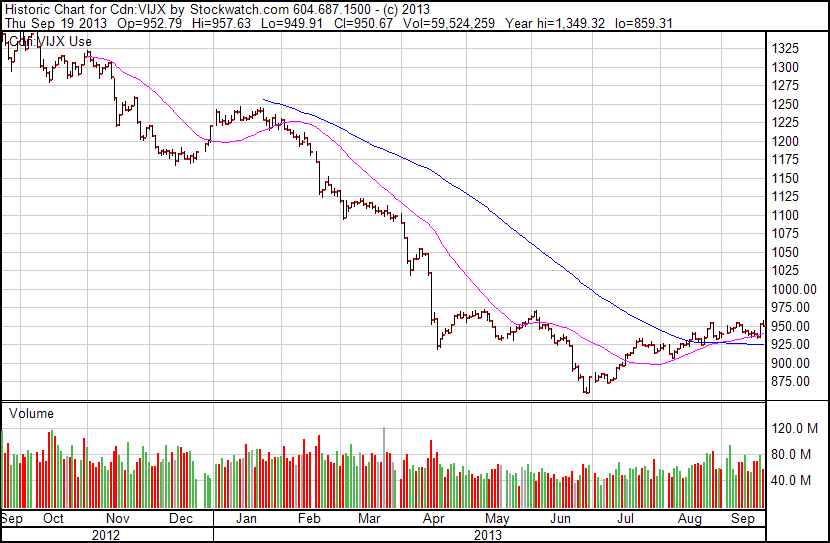Yesterday Stockwatch reported that well known Canadian financier Frank Giustra was rolling back his public shells. These are the vehicles he has historically used to launch new natural resources ventures.
Frank Giustra's Royce Resources Corp. (ROY), last at 1.5 cents, will ask shareholders at its AGM on Oct. 17, 2013, to approve a 1:10 rollback. The shell has 100.29 million shares outstanding. Mr. Giustra has been rolling back his shells for two years. In 2011, his Sky Ridge Resources Ltd. (SYR: $0.055) rolled back 1:3;Tapango Resources Ltd. (TPA: $0.05) rolled back 1:2; Cannon Point Resources Ltd. (CNP: $0.18) rolled back 1:4; and in 2012 his Pacific Topaz Resources Ltd. (PPZ: $0.06) rolled back 1:5. After Royce rolls back, the only remaining diluted shell in Mr. Giustra's stable will be PNO Resources Ltd. (PNO: $0.035), which has 74.41 million shares outstanding.
Mr. Giustra has not found a project for any of his shells since March, 2011, when his Westward Explorations Ltd. launched an African iron ore explorer, West African Iron Ore Corp. (WAI: $0.03). He has, however, kept busy with plenty of other investments. Earlier this week, on Monday, U.S. Oil Sands Inc. (USO: $0.16) said that Mr. Giustra will acquire part of an $80-million private placement and join its board following the financing. The company needs piles of money to develop its PR Spring oil sands project in Utah. Then on Tuesday, Endeavour Mining Corp. (EDV: $0.81) said Mr. Giustra has returned to its board of directors. Endeavour, which owns three gold mines in Africa, has risen 10 cents since the announcement. Canaccord rates Endeavour a speculative buy, but in July it cut its target price to $1.80 from $3.
Mr. Giustra is also the sole financier of a new agricultural magazine called Modern Farmer, which last week released its second issue. It has a goat on the cover. Inside the magazine are articles about goats, outer space farming and soil cuisine, as well as a contributing article from Mr. Giustra's good friend, former president Bill Clinton.
The Royce rollback rings the end of an era when Giustra backed vehicles, often with nine figure share structures, flourished at raising capital and developing resource assets.
The value of a shell, otherwise known as a "Lift" or "Promote", grew to values in the many tens if not hundreds of millions, for men like Giustra, who had track records of value creation, and strong investor appetite for their products.
Investors have become far less willing to pay such promotes in light of the dreary junior resource capital markets of the past two years.
Batista
Wall Street Journal has the scoop on Eike Batista, the resource financier whose net worth fell from $30 billion to less than $1 billion over the past year.
Batista is selling assets to cover debts, but tells the Wall Street Journal that he'll be back.
TSXV
After a terrible two years, appetite for junior resource stocks is starting to return, as demonstrated by the TSX-Venture Index, a barometer for the industry.
In the coming TSX-V bull market, discoveries in shells with tight share structures will rise to mind blowing heights.
Alpha Minerals, which rose from $.20 to $7 this past year with only 27 million shares out, offers a prime example.
Related: You Should Have It So Good
























Share count doesn’t and shouldn’t matter. What matters is value (and dilution). Liquidity is important in this market and what large share counts often provide is a lot of liquidity. Institutions need liquidity to get involved and, in fact, I spoke with the PM of one of the best performing gold funds in Canada and he said he is only getting involved in deals with sufficient liquidity because of the redemptions he and other funds are seeing these days.
Share structure is psychological more than fundamental.